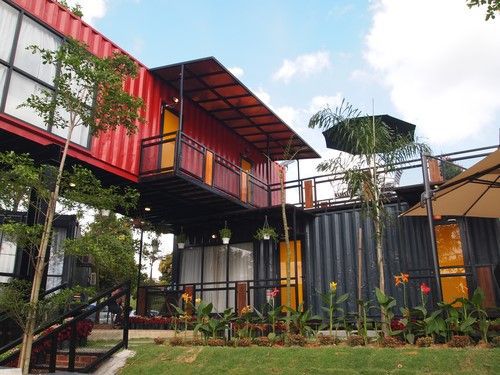- Rent, Lease, or Purchase
- |
December 23, 2020
Why a Shipping Container Building Is a Great Alternative

Shipping container buildings are created using steel Conex containers. Thanks to their modular designs and attractive, modern look, they’re gaining in popularity.
Starting in the early 2,000s, people began looking to containers for use as tiny homes, luxury homes, apartments, and shopping malls. From full-fledged offices and cafes to clinics and retail shops, construction using these modular units only seems to find more applications.
Businesses worldwide use shipping containers for temporary and remote storage and office space, because they have a much faster turnaround time than traditional brick-and-mortar construction.
A shipping container building is also easy to modify. You can join multiple containers, add accessories, insulation, and interior finishes for a secure, aesthetically pleasing, and fully functional container build in only a matter of days.
What Can You Build with Shipping Containers?
Shipping container architecture offers the ease and convenience associated with a modular design. Owners can quickly expand or modify the design by adding more units. You can also stack these units to create more space in the same ground area.
Container Office

One of the most common applications of container units is mobile offices. You can select a portable office unit or make appropriate customizations to meet your needs.
Pre-built office units typically have in-built HVAC, phone and data boxes, lights, and insulation. You can also purchase an office-storage combo unit with accessories such as plan tables, shelves, and pipe racks.
If you prefer to put your building together from scratch, you can play around with the design and get creative with the exterior by painting it to reflect brand colors or simply put your business logo on top for an original office space.
Emergency Clinics

Shipping containers can easily transform into fully functioning primary healthcare units, mobile testing centers, or emergency rooms, making them particularly useful in remote areas with limited accessibility. These units are also ideal as medical and rehabilitation centers during disaster relief operations.
During community health crises, such as pandemics, remote clinics and container hospitals enable fast and easy deployment of response measures. Shipping container clinics can help provide crucial medical care, counseling, exams, and diagnoses to isolated communities by professional healthcare practitioners.
Shipping Container Homes

Shipping container homes offer a reliable and flexible alternative to traditional houses.
A 20-foot shipping container home will provide about 160 square feet of space, while a 40-foot container gives you 320 square feet of home living space. If narrow width is a concern, you can create a wider home by combining multiple units and removing the walls in between units. Stacking containers also buys you more real estate and offers a modern aesthetic.
Because building a shipping container home is a relatively new concept, you must check with local authorities to make sure you are in compliance with building codes and zoning regulations.
Emergency Shelters

Shipping containers are ideal for creating emergency homes, shelters, and bunkers in hurricane-prone regions or areas with a high frequency of tropical storms and tornadoes. As these units help transport cargo at high seas, they can withstand winds of up to ~90 miles per hour!
You can buy or build aboveground container-based shelters for storm protection, but note that such units need internal reinforcements and to be anchored to a concrete slab.
In the event of a disaster, shipping containers can be converted into temporary homes for affected individuals and help ease relief and rehabilitation activities.
Markets

Shipping containers create attractive shopping spaces, flea markets, seasonal markets for produce, and much more.
Did you know that the biggest shipping container market in Europe spans more than 170 acres? Tolchok, or the Seventh-Kilometer market in Ukraine, boasts 16,000 vendors and employs 1,200 security guards and maintenance workers.
Shipping containers also helped restore the Cashel Mall in Christchurch, New Zealand, after an earthquake devastated the business district.
Learn how you can use a shipping container to start your own cafe.
Warehouses

In busy seasons, the need to warehouse goods might be temporary, and buying commercial space can be expensive. In such cases, renting a storage container is a great solution that makes a sturdy warehouse to protect contents from wind, moisture, and bad weather.
A container building can tackle the space crunch during peak holiday seasons quickly and efficiently. One key benefit is that they are immediately usable as warehouses, without having to make any significant modifications. You can use these versatile units for storing building materials, finished goods, raw materials, and even perishable goods.
Garage

The container's strong steel body provides a secure space for automobiles and can be used by car dealerships that need affordable space. These garages are quick, cost-efficient, and help transport your vehicle when needed.
Explore other important reasons why you should use shipping containers for your garage.
Barns

Shipping containers are ideal for storing fresh farm produce or long-term storage of processed products. Compared to wooden barns, these steel units can sustain rain, wind, and fires. You can also use a high-security unit with HASP locks to prevent theft, tampering, and break-ins.
If you intend to store perishable goods, use insulated, climate-controlled containers to maintain optimum temperature, which improves your product's shelf life.
Permits and Building Codes
Shipping containers are subject to codes and zoning regulations.
A building code is the minimum set of standards or prerequisite rules that a building must fulfill in order to receive an occupancy permit. Zoning regulations are a set of guidelines that define the locations where you can build a house or keep a similar structure next to your home.
In 2019, the International Code Council (ICC) voted to incorporate shipping containers in the International Building Code (IBC) 2021, giving these units the same significance as any other building material. However, each jurisdiction needs to accept IBC codes, which can vary from state to state.
While constructing shipping container homes or buildings, you need to prove that your structure adheres to relevant codes and local regulations in the permit application. We recommend discussing permits with a general contractor or architect.
Pros and Cons of Multi-Container Buildings vs. Traditional Construction
Pros
- A durable, high-strength, Corten steel body shields the structure from strong winds and harsh weather.
- Shipping containers are deployed and ready to use much more quickly than time-consuming brick-and-mortar construction.
- Basic modifications on shipping containers are comparatively less expensive, making them a more cost-effective solution.
- Containers are highly flexible, allowing for more creative modifications and designs. Architects and construction experts who specialize in such structures can help you modify the design as per your preferences.
Cons

- Used storage units may have dents, scratches, rust or other forms of corrosion on the inside from spills. Or they may be nearing the end of their life span. You will need to inspect your cargo unit for existing damage.
- Maintaining optimum insulation, temperature, and humidity in shipping container structures can be expensive. This, combined with land costs, foundation, and other installations, may require a larger budget.
- Obtaining zoning and construction permits can be tedious in certain regions or municipalities.
Conclusion
Shipping containers are a great alternative to brick-and-mortar structures. They are easy to deploy, flexible, and convenient to set up. With a reliable container provider and keeping in mind the pros and cons, you can turn containers into a unique building that stands out from the rest.
If you need to buy containers for your project, reach out to Mobile Modular Portable Storage. We won't keep you waiting. You will typically hear from our team in one business hour.
- We own a fleet of trucks and trailers for hassle-free delivery.
- We deliver units on the scheduled day.
- Our skilled, friendly drivers ensure proper delivery and setup.
- Get high-security units and containers for disaster relief, Covid-19 response, and emergencies.
Contact our experts at 866.459.7600 to learn more about building with containers.
Frequently Asked Questions
Are shipping container buildings more expensive than regular ones?
They can be cheaper if the modifications you need are minimal. Container homes and buildings can become expensive due to land costs, transportation costs, insulation, weather, and interior modifications.
Work with your architect or contractor for budget estimates and workarounds. For example, typically expensive excavations are required on inclined or rocky locations. However, an architect can suggest less expensive options, such as using robust pilings instead.
Are container buildings eco-friendly?
Structures that are repurposed for another use reduce the ecological impact of new construction. Turning these steel boxes into habitable structures will reduce the pollution, waste, and debris generated by new construction.
Are container buildings durable?
Container buildings have a high-strength Corten steel body that makes them incredibly durable and able to sustain winds, climate-based wear, and physical tampering. The fact that the International Building Code (IBC) now recognizes containers as legitimate building material indicates their reliability.
How can you build a shipping container home?
- Talk with a designer or architect who specializes in such designs and select a suitable plan.
- Check with local authorities for authorizing the design and complying with zoning permits.
- Contact a provider to source containers.
Once you receive the approval, contact an expert to add appropriate insulation, accessories, and utilities to your home.
Related Blogs



Subscribe to Our Blog
Enter your email address to subscribe to the blog and receive the notification of new posts by email.
Thank You for Subscribing to Our Blog!
Stay tuned for upcoming emails with valuable content that we hope will enhance your experience with our brand.
Both Pardot and mg360 form submissions failed.
